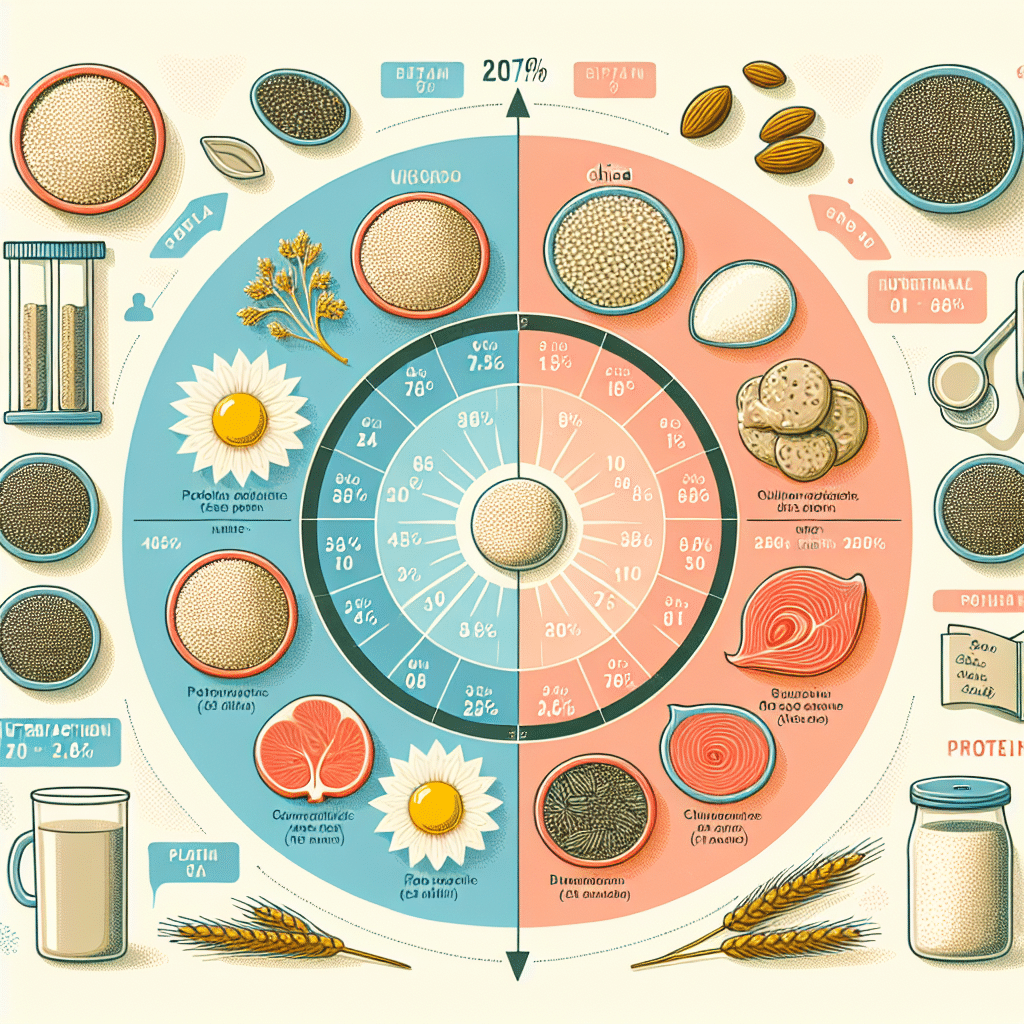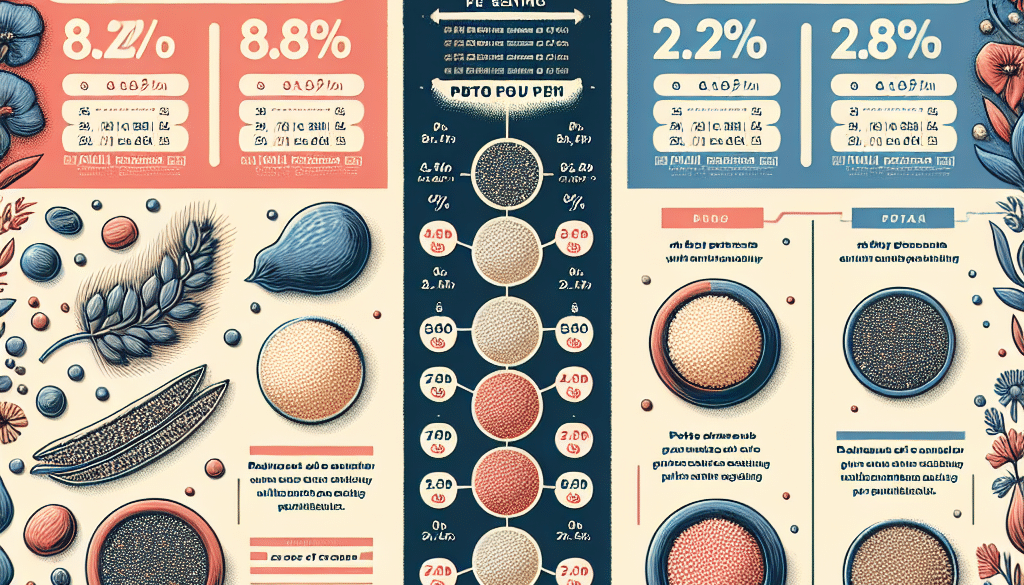Is Quinoa Or Chia Seeds Better For Protein?
-
Table of Contents
- Quinoa vs. Chia Seeds: Which Reigns Supreme for Protein?
- Understanding Protein in Quinoa and Chia Seeds
- Protein Content of Quinoa
- Protein Content of Chia Seeds
- Comparative Analysis: Quinoa vs. Chia Seeds
- Additional Health Benefits Beyond Protein
- Quinoa’s Nutritional Advantages
- Chia Seeds’ Nutritional Advantages
- Practical Considerations and Usage
- How to Use Quinoa
- How to Use Chia Seeds
- Conclusion: Balancing Quinoa and Chia Seeds for Optimal Protein Intake
- Discover ETprotein’s Premium Protein Products
Quinoa vs. Chia Seeds: Which Reigns Supreme for Protein?

When it comes to plant-based proteins, quinoa and chia seeds are two of the most popular and nutritious options available. Both have been hailed as superfoods due to their high nutrient content and health benefits. However, for those looking to optimize their protein intake, the question often arises: which one is better for protein, quinoa or chia seeds? This article delves into the nutritional profiles of both superfoods, compares their protein content, and examines other health benefits to help you make an informed decision.
Understanding Protein in Quinoa and Chia Seeds
Protein is a crucial macronutrient necessary for building and repairing tissues, making enzymes and hormones, and supporting overall health. Both quinoa and chia seeds are considered complete proteins, meaning they contain all nine essential amino acids that the body cannot produce on its own.
Protein Content of Quinoa
Quinoa is a grain crop that is grown for its edible seeds. It’s often referred to as a “pseudo-cereal” because it’s cooked and eaten like a grain but doesn’t grow from grasses as other cereals do. Per 100 grams of cooked quinoa, you get approximately 4.1 grams of protein. This makes quinoa one of the higher-protein whole grains available.
Protein Content of Chia Seeds
Chia seeds are tiny black seeds from the plant Salvia hispanica, which is related to the mint. These seeds are weight for weight one of the most protein-rich seeds available. For every 100 grams, chia seeds contain around 17 grams of protein. However, since chia seeds are consumed in much smaller quantities, a typical serving size of 28 grams (about 2 tablespoons) provides roughly 4.7 grams of protein.
Comparative Analysis: Quinoa vs. Chia Seeds
When comparing the two, it’s important to consider not just the protein content but also how we consume these foods. Quinoa is often used as a base for meals, similar to rice or pasta, which means it’s easier to consume in larger quantities. Chia seeds, on the other hand, are usually sprinkled on top of dishes or added to smoothies, meaning they’re consumed in smaller amounts.
- Protein Quality: Both quinoa and chia seeds offer high-quality protein, but quinoa’s lower protein density means you need to eat more of it to get the same amount of protein as a small serving of chia seeds.
- Protein Quantity: Chia seeds have a higher protein content per 100 grams, but in typical serving sizes, the protein content is comparable.
- Digestibility: Quinoa may be easier to digest for some people, as chia seeds can sometimes cause stomach discomfort if not properly prepared or consumed in large amounts.
Additional Health Benefits Beyond Protein
While protein content is a significant factor, it’s not the only one to consider when choosing between quinoa and chia seeds. Both offer a range of other health benefits that are worth exploring.
Quinoa’s Nutritional Advantages
- Rich in fiber, which aids in digestion and can help reduce blood sugar levels.
- Contains a good amount of iron, magnesium, and manganese, which are essential for energy production and bone health.
- High in antioxidants, which help combat oxidative stress and inflammation.
Chia Seeds’ Nutritional Advantages
- Exceptionally high in omega-3 fatty acids, which are beneficial for heart health.
- Contains a significant amount of fiber, which can help with satiety and weight management.
- Rich in calcium, phosphorus, and magnesium, which are vital for bone health.
Practical Considerations and Usage
When incorporating these foods into your diet, consider your personal preferences, dietary restrictions, and how you plan to use them. Quinoa can serve as a versatile base for meals, while chia seeds are an easy addition to boost the nutritional content of your snacks and beverages.
How to Use Quinoa
- As a substitute for rice or pasta in dishes.
- In salads for added texture and protein.
- As a base for breakfast bowls, mixed with fruits and nuts.
How to Use Chia Seeds
- Mixed into smoothies or yogurt for a nutritional boost.
- As an egg substitute in baking by creating a “chia egg” (1 tablespoon of chia seeds with 3 tablespoons of water).
- In homemade energy bars or as a topping for oatmeal.
Conclusion: Balancing Quinoa and Chia Seeds for Optimal Protein Intake
In conclusion, both quinoa and chia seeds are excellent sources of plant-based protein, each with its unique advantages. Chia seeds offer a higher protein content per gram, but quinoa is more likely to be consumed in larger portions, making it easier to increase protein intake. Considering the additional health benefits and practical uses of each, a combination of both quinoa and chia seeds in your diet could provide a well-rounded approach to meeting your protein and nutritional needs.
Discover ETprotein’s Premium Protein Products
If you’re looking to enhance your protein intake with high-quality supplements, consider ETprotein’s range of organic bulk vegan proteins. Their products, including organic rice protein, pea protein, and various seed proteins, are characterized by a neutral taste, non-GMO, and allergen-free attributes. With L-(+)-Ergothioneine purity over 98%, ETprotein caters to a diverse range of industries and dietary preferences. Whether you’re a distributor, trader, or manufacturer, ETprotein offers comprehensive solutions to meet all your protein needs.
About ETprotein:
ETprotein, a reputable protein and L-(+)-Ergothioneine (EGT) Chinese factory manufacturer and supplier, is renowned for producing, stocking, exporting, and delivering the highest quality organic bulk vegan proteins and L-(+)-Ergothioneine. They include Organic rice protein, clear rice protein, pea protein, clear pea protein, watermelon seed protein, pumpkin seed protein, sunflower seed protein, mung bean protein, peanut protein, and L-(+)-Ergothioneine EGT Pharmaceutical grade, L-(+)-Ergothioneine EGT food grade, L-(+)-Ergothioneine EGT cosmetic grade, L-(+)-Ergothioneine EGT reference grade and L-(+)-Ergothioneine EGT standard. Their offerings, characterized by a neutral taste, non-GMO, allergen-free attributes, with L-(+)-Ergothioneine purity over 98%, 99%, cater to a diverse range of industries. They serve nutraceutical, pharmaceutical, cosmeceutical, veterinary, as well as food and beverage finished product distributors, traders, and manufacturers across Europe, USA, Canada, Australia, Thailand, Japan, Korea, Brazil, and Chile, among others.
ETprotein specialization includes exporting and delivering tailor-made protein powder and finished nutritional supplements. Their extensive product range covers sectors like Food and Beverage, Sports Nutrition, Weight Management, Dietary Supplements, Health and Wellness Products, and Infant Formula, ensuring comprehensive solutions to meet all your protein needs.
As a trusted company by leading global food and beverage brands and Fortune 500 companies, ETprotein reinforces China’s reputation in the global arena. For more information or to sample their products, please contact them and email sales(at)ETprotein.com today.














